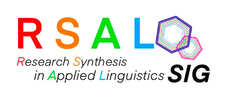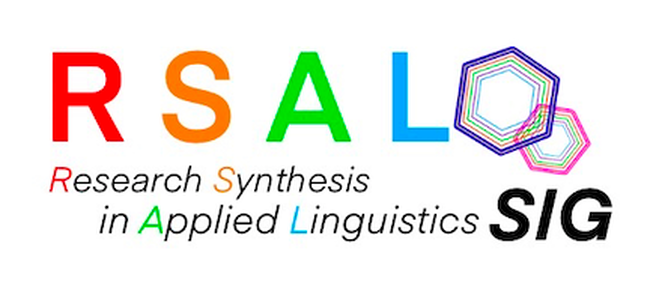Rationale for having this SIG
Research synthesis is a stand-alone literature review which summarises existing empirical evidence or theoretical/conceptual/methodological discussions on a selected topic. It is widely practised in such disciplines and fields as medicine, healthcare, social sciences where aggregated research evidence and evidence-based practices are much needed. In Applied Linguistics and TESOL, there has been an increasing interest in not only traditional secondary research but also systematic secondary research, i.e., research synthesis. Specifically, research synthesis has been increasingly placed under the limelight in Applied Linguistics research in recent years, especially those which aggregate quantitative research findings (i.e., meta-analyses). Because of its substantive nature, research synthesis is often widely read and cited, and therefore influential. For this reason, it is crucial to promote various types of research synthesis to both researchers and practitioners regarding its production and consumption.
The impetus for setting up this SIG is a response to the thriving interest in research synthesis in Applied Linguistics and TESOL. By bringing together researchers, synthesists, and practitioners in the field, this SIG aims to develop a community of practice for research synthesis both informally (by socialising and attending events) and formally (by building online resources for members interested in research synthesis methodologies and applications). Another important objective of this SIG is to promote research synthesis to both researchers and teaching professionals. For researchers, this SIG provides a platform to discuss methodological issues of various types of research synthesis and present synthesised findings on Applied Linguistics and TESOL topics related to teaching and learning (e.g., instructed second language acquisition). For practitioners, this SIG provides useful resources for them to access research synthesis and discuss ways for better dissemination and representation of synthesised findings.
It is a common belief that research synthesis is mostly read by researchers as background work to inform their own research endeavours; nevertheless, a very important element of this SIG is to demonstrate the value of research synthesis to inform pedagogical decisions (Chong, 2021). Finally, a distinct feature of this SIG is our collaboration with other research institutes which specialise in research synthesis in education and social sciences, including Evidence for Policy and Practice Information and Co-ordinating Centre (EPPI-Centre) at UCL and Campbell UK & Ireland. Through the involvement of these strategic partners, this SIG strives to foster an interdisciplinary partnership with other academic disciplines to further develop and promote research synthesis practices in our own field.
Specifically, Research Synthesis in Applied Linguistics SIG aims to:
The impetus for setting up this SIG is a response to the thriving interest in research synthesis in Applied Linguistics and TESOL. By bringing together researchers, synthesists, and practitioners in the field, this SIG aims to develop a community of practice for research synthesis both informally (by socialising and attending events) and formally (by building online resources for members interested in research synthesis methodologies and applications). Another important objective of this SIG is to promote research synthesis to both researchers and teaching professionals. For researchers, this SIG provides a platform to discuss methodological issues of various types of research synthesis and present synthesised findings on Applied Linguistics and TESOL topics related to teaching and learning (e.g., instructed second language acquisition). For practitioners, this SIG provides useful resources for them to access research synthesis and discuss ways for better dissemination and representation of synthesised findings.
It is a common belief that research synthesis is mostly read by researchers as background work to inform their own research endeavours; nevertheless, a very important element of this SIG is to demonstrate the value of research synthesis to inform pedagogical decisions (Chong, 2021). Finally, a distinct feature of this SIG is our collaboration with other research institutes which specialise in research synthesis in education and social sciences, including Evidence for Policy and Practice Information and Co-ordinating Centre (EPPI-Centre) at UCL and Campbell UK & Ireland. Through the involvement of these strategic partners, this SIG strives to foster an interdisciplinary partnership with other academic disciplines to further develop and promote research synthesis practices in our own field.
Specifically, Research Synthesis in Applied Linguistics SIG aims to:
- Promote the values and practices of research synthesis in Applied Linguistics and language education in advancing research and research-practice dialogues;
- Discuss and advance methodological traditions and issues of conducting different types of research synthesis;
- Facilitate interdisciplinary dialogues with specialists in research synthesis in other disciplines (e.g., education).
Reference
Chong, S. W. (2021). The role of research synthesis in promoting research-pedagogy dialogue. ELT Journal, 74(4), 484-487.
Description of SIG logo
The different colours in the four letters of the SIG acronym and the two hexagons depict a “bright” and “colourful” future of the field of Applied Linguistics, highlighting the significant role played by research synthesists and syntheses. The two hexagons, mimicking shapes of chemical elements, underscore scientific and methodological rigour of research syntheses. This logo is designed by Ms. Cheuk-Lai (Cherry) Au.
Patron of BAAL Research Synthesis in Applied Linguistics SIG
|
We are pleased to announce that the International Education Institute, University of St Andrews, is the patron of BAAL Research Synthesis in Applied Linguistics from 2023 to 2025. The International Education Institute delivers foundation and postgraduate programmes, as well as pre-sessional and short courses that combine academic subject knowledge with English language skills and cultural adaptation studies. At a postgraduate level, they are currently offering two MScs in TESOL and International Education, and a DProf in TESOL.
|



